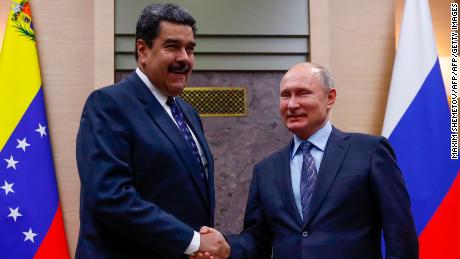EDITOR’S NOTE: This article was originally published as part of the Spring 2019 magazine.
Russia is back. After hibernating in a post-Soviet Union slumber for several decades, the Russian state has re-emerged and proven itself as a world superpower. It first flexed its superpower muscles in 2014, annexing the Crimean Peninsula over the objections of NATO. In 2015, Russia began supplying air support to the criminal Assad regime in the Syrian Civil War, allowing Assad to quell the forces that threatened his reign. Recently, President Putin’s declaration of support for the Maduro regime in Venezuela evoked fears that the long-standing Monroe Doctrine was being challenged. As it turns out, Russia’s defense of the Maduro regime is just the latest example of an orchestrated attempt to stretch the Russian sphere of influence into Latin America.
President Nicolas Maduro and Juan Guaidó, the President of the National Assembly of Venezuela, have both declared themselves President of Venezuela. In 2018, despite hyperinflation and a historically weak economy, Maduro appeared to be the overwhelming victor of the Venezuelan presidential election. However, the election was nothing more than a sham. The election administrators were Maduro appointees, popular Maduro opponents were not allowed to register for the ballot, and reported participation rates were down sharply. Under the Venezuelan Constitution, the established discrepancies mean that Mr. Guaidó should be the interim President until new, fair elections can be held. The United States and its NATO allies have backed Guaidó’s claim on the Presidency, but Russia stands in the way. Russia has made the unprecedented step of warning the United States to stay out of the conflict. Moreover, Russia recently sent nuclear-capable bombers and private military contractors to Venezuela in a show of support for Maduro. Not since the Cold War has the Russian state had the audacity to directly challenge the United States in the Western Hemisphere.
Russia has been quietly flexing its muscles in Latin America for several years. Since 2000, President Putin and former President Dmitri Medvedev have visited Latin America 16 times. In 2014, Russia forgave $32 billion in debt owed to it by Cuba, and in 2016, announced that it would finance over $4 billion in economic development projects in the island nation. Since 2015, Nicaragua has allowed Russian navy ships full access to coastal waters and ports, and US officials suspect that the Russians have installed an espionage base there as well. Meanwhile, Russia is cultivating stronger economic and diplomatic relationships with Latin American titans Brazil, Argentina, and Mexico.
What is Russia’s goal in all of this? Sure, there is some economic incentive for a closer relationship with Latin America, especially as it relates to fellow oil-producing countries and to countries that are major buyers of Russian weapons. Russia’s main goal, however, is to undermine the Western-dominated liberal world order based on the premises of democracy, free trade, globalization, and human rights. Under a liberal world order, Western powers have extended their economic reach across the globe and have aided in the removal of authoritarian leaders who violated human rights. In the collective Russian opinion, this world order amounts to an attempt by the Western world to reshape the rest of the world in its image. Russian leaders equate their pushback against the liberal world order with the protection of their own traditions and sovereignty. To support and promote authoritarianism in Latin America and throughout the world, Russia hopes to solidify its position as the leader of an alliance of nations united around a governing philosophy that favors tradition and order over democracy and freedom. Furthermore, by growing its military presence in Latin America, Russia may gain the leverage to dictate terms to the United States in other areas of the world. Since the end of the Cold War, the United States has been the only major military power with a presence in the Western Hemisphere. With that distinction gone, President Putin gains a powerful bargaining chip to use in his game of geopolitical poker.
Whether the crisis in Venezuela evolves into a military conflict remains to be seen. What can be assured is that the Russians will not hesitate to provide heavy military support to Maduro should the situation escalate to that level. The Russians have already directly challenged the United States in the Middle Eastern theater, establishing no-fly zones in Syria and countering American attempts to provide air support to anti-Assad forces. By involving itself in a military conflict just over 1,000 miles from the shores of the United States, Russia could remove all doubt that it has returned to its former status as a world superpower. Historians may one day look back at this moment as the one that officially kicked off the second Cold War.
